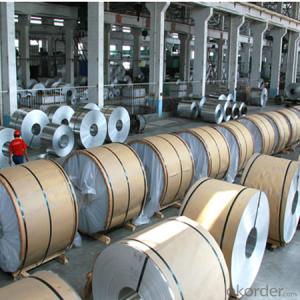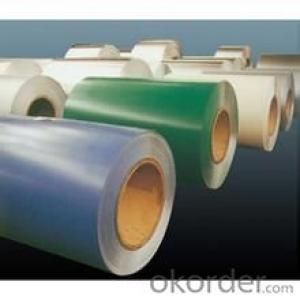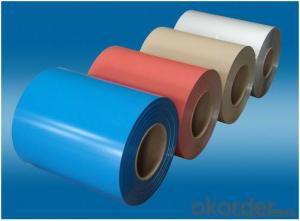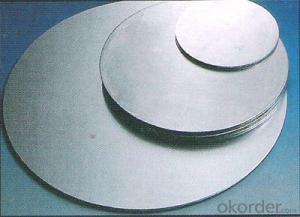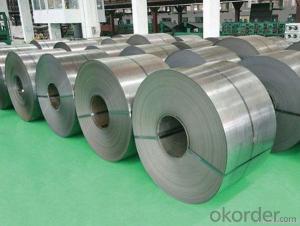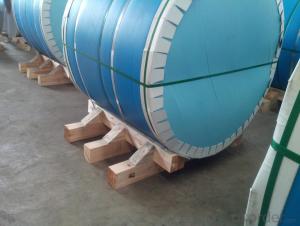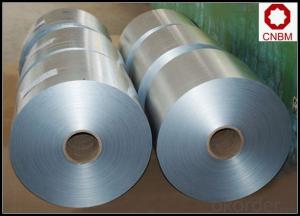High Quality CC Mill Finished Aluminum Coil Slitter
- Loading Port:
- Shanghai
- Payment Terms:
- TT OR LC
- Min Order Qty:
- 5 m.t.
- Supply Capability:
- 10000 m.t./month
OKorder Service Pledge
OKorder Financial Service
You Might Also Like
Specification
1. Specification of CC Mill Finished Aluminum Coil with High Quality
Material | Alloy Aluminum 6063,6061,6005 or customer nominated |
Temper | T3, T4, T5, T6 |
Surface | Anodize, electrophoresis, powder coating, PVDF coating, wood grain painting, matted, etc. |
Colour | Any colour based on Standard Germany RAL Mark |
Length | Coating 6.5 meters, Anodizing 6.5 meters, Mill finish 5 meters |
Press Machine | 500-4000 tons all together 64 press lines. |
Fabrication | 1. Windows and doors; 2. Drilling; 3. Bending; 4. Cutting; 5. etc. |
Certificate | ISO 9001 |
Moulding | 1. Using our moulds, no fee; |
2. Using customer drawing, opening mould, usually about 10~50 tons then the moulding can be refunded. | |
3. Mould cost is negotiable base on the order quantity | |
Capability | Annual output 100,000 tons |
2. Application of CC Mill Finished Aluminum Coil with High Quality
(1).Interior: wall cladding, ceilings, bathrooms, kitchens and balconies, shutters, doors...
(2).Exterior: wall cladding, facades, roofing, canopies, tunnels,column covers , renovations...
(3).Advertisement: display platforms, signboards, fascia, shop fronts...
3. Feature of CC Mill Finished Aluminum Coil with High Quality
*Such coil is specially designed to replace aluminum ingot, due to the high export tax of aluminum ingot, the coil has better price than ingot.
*This type of coil can fit customer's remelting furnace just like ingot, no need to make any change to the production line that was previously used for ingot. The standard coil size and weight is very suitable for the feed gate of furnace.
*This type of coil causes less material wastage than ingot when remelted.
*Our coil is made directly from ore, no need to go though the ingot making process, quality is much better than other suppliers who use ingot scrap to make coil.
Be free from Oil Stain, Dent, Inclusion, Scratches, Stain, Oxide Dicoloration, Breaks, Corrosion, Roll Marks, Dirt Streaks and other defect which will interfere with use
4. Certificate:
SGS and ROHS(if client request, paid by client), MTC(plant provided), Certificate of Origin(FORM A, FORM E, CO), Bureau Veritas and SGS (if client request, paid by client), CIQS certificate
5. Image of CC Mill Finished Aluminum Coil with High Quality
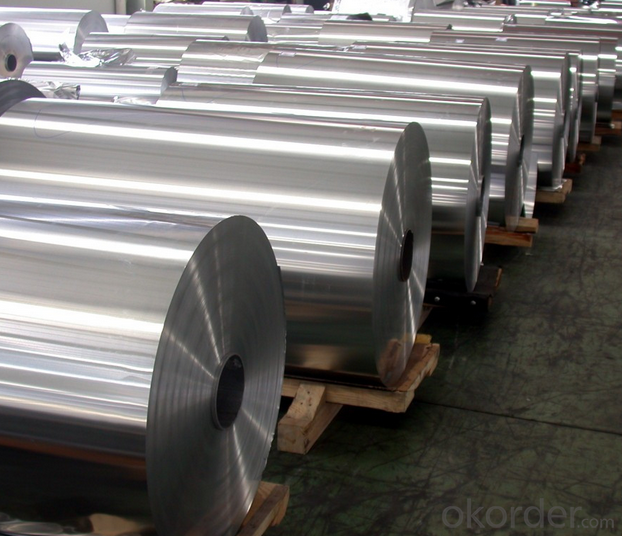
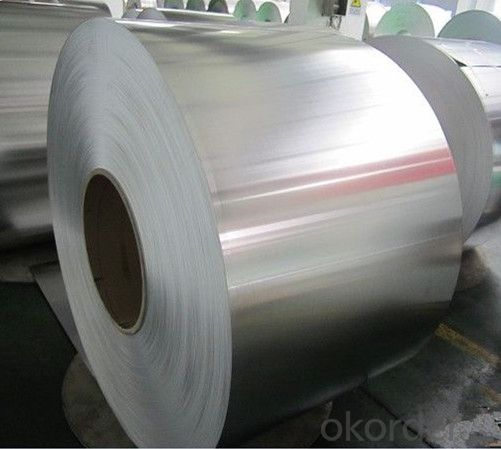
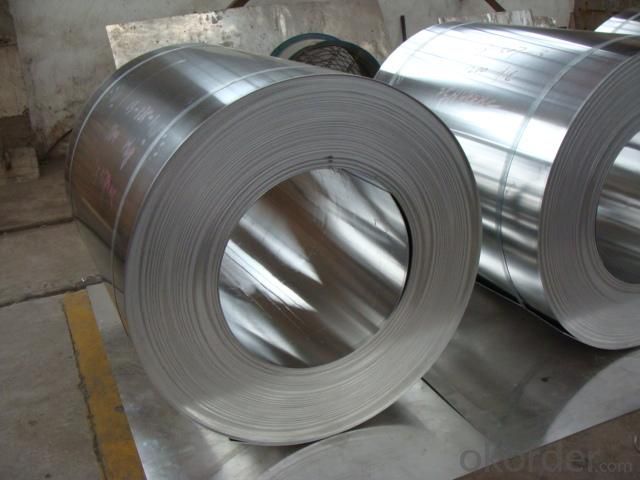
6. Package and shipping of PVEF Color Coating Aluminum Coil with High Quality
eye to wall
eye to the wall
with wood pallet (wooded case also available)
7. FAQ
1) What is the delivery time?
Dpends on actual order, around 20 to 35 days
2)What is the QC system:
We have QC staff of 20 persons and advanced equipment, each production is with MTC traced from Aluminum ingot lot.
3) What market do you mainly sell to?
Australia, America, Asia, Middle East, Western Europe, Africa etc
- Q: How are aluminum coils used in the production of solar panels?
- Aluminum coils play a crucial role in the production of solar panels. These coils are typically used in the construction of the photovoltaic (PV) module, which is the core component responsible for converting sunlight into electricity. Firstly, aluminum coils are used as the primary material for the frame of the PV module. The frame provides structural support and protection to the delicate solar cells, ensuring they are secure and safe from external factors such as weather conditions or physical damage. Aluminum's lightweight yet sturdy nature makes it an ideal choice for this purpose, as it offers durability without adding excessive weight to the overall structure. Secondly, aluminum coils are often used as the backsheet material in solar panels. The backsheet is a critical component that protects the solar cells from moisture, dust, and other environmental elements. It acts as a barrier, preventing any potential damage to the cells while also providing electrical insulation. Aluminum's excellent corrosion resistance and electrical conductivity make it an ideal material for this application. Furthermore, aluminum coils are used in the production of the interconnection system within the solar panel. This system consists of conducting wires that connect the individual solar cells, allowing the flow of electricity between them. Aluminum's high electrical conductivity ensures efficient transmission of the generated electricity, minimizing energy losses within the panel. In addition to these key roles, aluminum coils are also used in the manufacturing of various other components within solar panels, such as junction boxes, connectors, and mounting systems. These components contribute to the overall functionality and reliability of the solar panel. Overall, aluminum coils are extensively utilized in the production of solar panels due to their lightweight, durable, and corrosion-resistant properties. Their versatility and ability to withstand harsh environmental conditions make them an essential material for ensuring the longevity and efficiency of solar panel systems.
- Q: Are there any limitations to the maximum coil diameter of aluminum coils?
- There exist limitations on the maximum coil diameter of aluminum coils. Factors such as the type and thickness of the aluminum, the coiling equipment, and the intended application of the coil determine the maximum coil diameter. Thinner and more ductile aluminum alloys generally allow for larger coil diameters. However, maintaining the structural integrity of the coil and preventing deformation, wrinkling, or damage during handling and transportation becomes increasingly challenging as the coil diameter increases. Moreover, the coiling equipment may have its own restrictions on the maximum diameter it can handle. Hence, it is crucial to take these factors into consideration when determining the maximum coil diameter for aluminum coils.
- Q: What is the cost of aluminum coils?
- The cost of aluminum coils can vary depending on various factors such as the thickness, width, and length of the coil, as well as the market conditions and the supplier. Generally, the price of aluminum coils is determined by the current market price of aluminum, which is influenced by factors like supply and demand, production costs, and global economic conditions. It is advisable to contact suppliers or check online platforms to get accurate and up-to-date pricing information for aluminum coils.
- Q: Can aluminum coils be used in marine applications?
- Marine applications can indeed utilize aluminum coils. The popularity of aluminum in this field can be attributed to its remarkable resistance to corrosion, lightweight nature, and impressive strength-to-weight ratio. Boats, ships, and other marine structures are commonly constructed using aluminum due to these advantages. Specifically, aluminum coils are especially valuable in marine applications because they can be easily shaped and sized to fit different marine industry parts and components. Moreover, these coils possess the ability to endure harsh marine environments and exhibit exceptional resistance to corrosion caused by saltwater, a major concern in marine applications. All in all, the utilization of aluminum coils in marine applications is a dependable and efficient choice.
- Q: Is it possible to join steel coils using arc welding or gas welding techniques?
- <p>Yes, steel coils can be welded together using both arc welding and gas welding methods. Arc welding, specifically processes like Shielded Metal Arc Welding (SMAW) and Gas Metal Arc Welding (GMAW), is commonly used for joining steel due to its strength and versatility. Gas welding, which uses a fuel gas and an oxygen mixture to produce a flame, is also suitable for steel welding, although it may be less common in industrial settings due to the higher heat input and potential for distortion. Proper techniques and equipment are essential to ensure a strong, durable weld and to avoid defects such as cracking or warping.</p>
- Q: Can the displacement sensor be used for real-time measurement of the aluminum coil thickness?
- Yes, you can use two sensors to measure thickness, either contact sensor or laser sensor
- Q: Can aluminum coils be used for food storage and processing?
- Yes, aluminum coils can be used for food storage and processing. Aluminum is a versatile and safe material for food-related applications due to its corrosion resistance, lightweight nature, and ability to withstand extreme temperatures. It is commonly used in the food industry for packaging, cooking utensils, and processing equipment.
- Q: We are shopping for a new LQ trailer. We are looking at several different brands and noticed that some have aluminum skin on an aluminum frame, and others have aluminum skin on a steel frame. Other than the obvious differences in weight and cost, what are other benefits/disadvantages of each? Thanks
- Well, you already know the differences in weight and cost, so I won't address those. Advantages to an aluminum frame are that it will not rust although it may corrode. However, most steel frames now are coated to protect them from the elements and prevent rusting. Or, the steel can be galvanized. So, if you get a steel frame, check for this. Aluminum is a more brittle metal than steel, so some people think that is does not perform as well in a crash. However, there are no horse trailer crash statistics published to prove or disprove this. The flip side is that a steel frame can have hidden rust weakening it and making it perform poorly in a crash. Should something happen to your frame, steel is often reparable, while aluminum sometimes is not and the trailer is totaled. Aluminum is more difficult to weld than steel.
- Q: What are the different coil coating options for aluminum coils?
- There are several coil coating options available for aluminum coils, including polyester, polyurethane, fluoropolymer, and plastisol coatings. Each option offers unique benefits, such as durability, weather resistance, and aesthetics, allowing for customization based on specific requirements or desired appearance.
- Q: Is it safe to use aluminum coil for storing food?
- <p>Aluminum coil can be used for food storage, but with certain considerations. Aluminum is a good conductor of heat and is often used in cookware, but for long-term food storage, it's not ideal. It's important to ensure that the aluminum is coated or lined with a non-reactive material to prevent direct contact with food, as aluminum can leach into food and may have health implications. Additionally, aluminum is not recommended for acidic foods as it can react with them. For best food storage practices, consider using materials specifically designed for food contact, such as glass or food-grade plastic containers.</p>
Send your message to us
High Quality CC Mill Finished Aluminum Coil Slitter
- Loading Port:
- Shanghai
- Payment Terms:
- TT OR LC
- Min Order Qty:
- 5 m.t.
- Supply Capability:
- 10000 m.t./month
OKorder Service Pledge
OKorder Financial Service
Similar products
Hot products
Hot Searches
Related keywords
